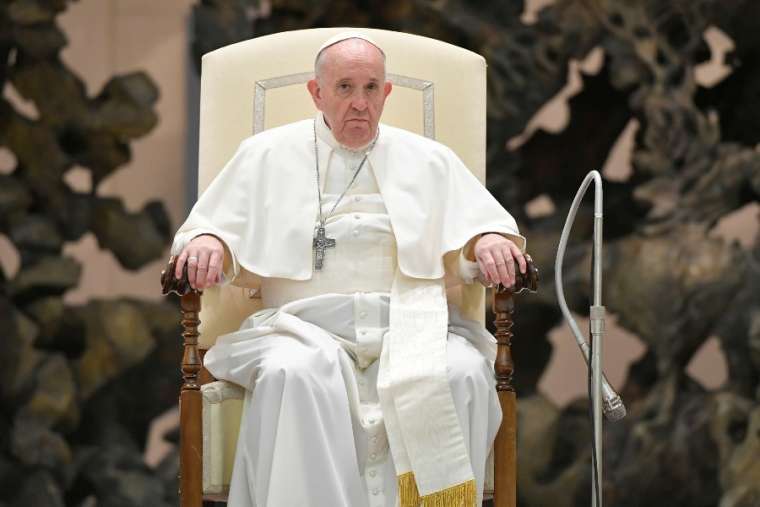Pope Francis at his general audience in the Paul VI Audience Hall at the Vatican Oct. 28, 2020. Credit: Vatican Media.
Pope Francis appealed for an end to violence in Cameroon Wednesday after seven students were killed in an attack on a school in the city of Kumba.
“I participate in the suffering of the families of the young students barbarically killed last Saturday in Kumba, in Cameroon. I feel great bewilderment at such a cruel and senseless act, which tore the young innocents from life while they were attending lessons at school,” Pope Francis said at the end of his general audience yesterday.
“May God enlighten hearts, so that similar gestures may never be repeated again and so that the tormented regions of the northwest and southwest of the country may finally find peace. I hope that the weapons will remain silent and that the safety of all and the right of every young person to education and the future can be guaranteed.”
Gunmen attacked Mother Francisca International Bilingual Academy, a school in Cameroon’s Southwest region, on 24 October and opened fire on students in a classroom. A local education official told Reuters that all seven victims of the attack were between 12 and 14 years old.
Bishop Agapitus Nfon of Kumba will offer a Mass for the repose of the souls of the murdered students and for the consolation of their bereaved families at the diocese’s Sacred Heart Cathedral Friday 30 October.
“We shall also pray for the forgiveness and conversion of the Herod(s), the perpetrators of this heinous and barbarous act, while asking our loving Father in heaven to intervene for a lasting solution to be found so that true justice and peace may reign,” Bishop Nfon said in a statement shared with ACI Africa, CNA’s African news partner.
“Let us pray that by the power of the Holy Spirit He may turn the wicked and stone hearts of the Herod(s) (the murderers of our children) into hearts of love and flesh.”
The school attack took place amid conflict between separatists and government forces in the English-speaking territories in the country’s Northwest Region and Southwest Region. Tensions escalated after Francophone teachers and judges were sent to work in the historically marginalized Anglophone regions in 2016, and the dispute has come to be known as the Anglophone Crisis.
Schools in the Anglophone regions of the nation, which is located at the junction of western and central Africa, were previously closed due to the skirmishes. In September, separatist leaders in the country called for the resumption of schooling in the warring regions. The government announced the reopening of learning institutions for 5 October.
After the attack, Bishop Nfon questioned this reversal on the region’s schools: “Were they not allowed to go to school by those who previously restricted them for the past four years? How could they then ask children to go to school and turn around to massacre them?”
The bishop also noted that the killings came less than a year after 22 people, including children and pregnant women, were killed in another attack in the Diocese of Kumbo in the Ngarbuh village in February.
“What is holding back those concerned, I mean the international bodies and the government of Cameroon, to look for a lasting solution to this problem that will restore justice and peace?” the bishop asked.
“We are painfully weeping and pondering; what is so important other than peace that will make us sit back in indifference and watch tender and precious lives being wasted away?”
Source: CNA

